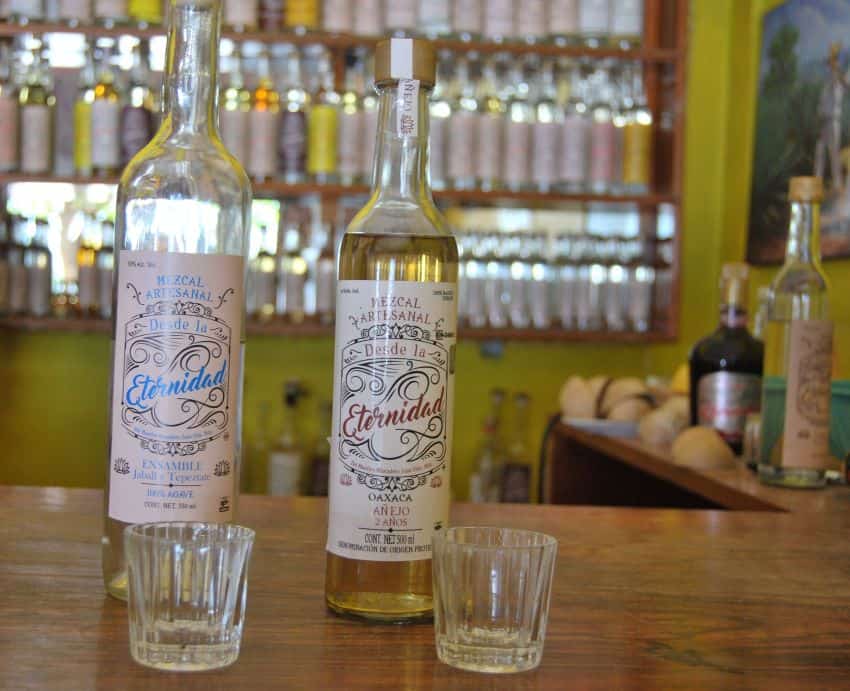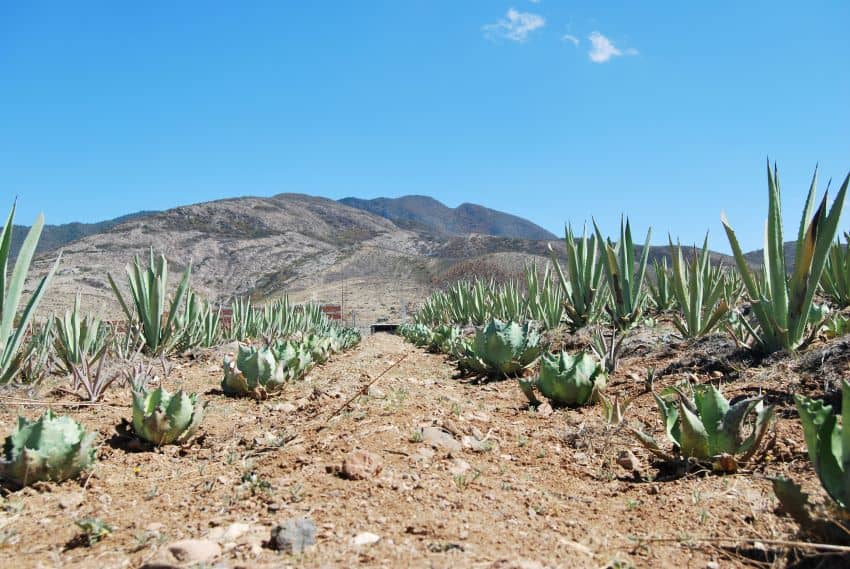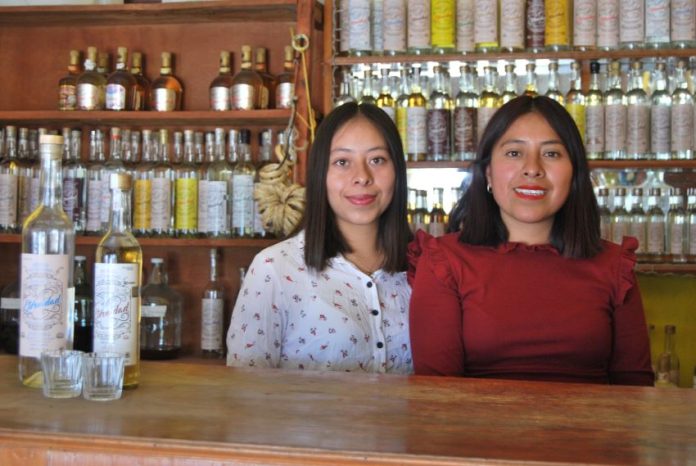A stiff wind tugs at the unmoving maguey plants in the Hernández’s front yard. The pit oven is smoldering slightly. When Lidia Hernández steps out the door of her house, she looks even younger than her 28 years. She’s petite and baby-faced, a giant cellphone sticking out of the back pocket of her jeans as she leads us to her family’s distillery at the edge of the highway in front of the house.
Santiago Matatlán, Oaxaca, where Lidia lives, sees hundreds of visitors a year in its 150 mezcal distilleries, but it remains a traditional small town. To see a young woman running one of those family distilleries is still a shock for many of her neighbors.
“I ran into one of my neighbors in a cab once on the way to the city, and he said to me, ‘That’s man’s work you’re doing. Only men should be [making mezcal],’” Lidia says while sitting on a bench inside the distillery. “My dad never said anything like that to me.”
When she mentions him, she still can’t decide whether to use “is my father” or “was my father.” She’s still getting used to the sound of the words in her own mouth.
Her dad, Juan Hernández Méndez, age 56, died a few months ago from Covid.

“It’s difficult,” she says, her face determined, her eyes soft with the pain. “Mostly because I miss him, you know? I never thought that my dad would die, that someday I would be without him. Sometimes I wonder why things happen. He was such a hardworking person, and I feel like he didn’t deserve it.”
Lidia’s father was a man always on the move, up at dawn to head out to the fields and always fiddling with one thing or another. He was a painter, a mezcalero, a farmer.
Married at 16, he built his distillery from the ground up, using five generations of mezcal-making knowledge that came before him in his family. Lidia describes him as meticulous, strict and an extremely hard worker.
“He only finished sixth grade, but he always had this wider vision. He wasn’t content to just do things the way they had always been done; he didn’t make excuses. He woke up every morning ready to work; that was most important,” she says.
Juan was proud of Lidia a year ago when she decided for the first time that she wanted to make her own mezcal. He had been training her in the family business since she was little. By 12 or 13, she and her two sisters, as well as her brother, all worked making mezcal, but she was the closest to her father and the most passionate about the work.
“I really loved the countryside from the time I was little. I think if I hadn’t liked it, I wouldn’t have been so close to him.”

Now that she is carrying on the family tradition without him, she’s starting to understand her destiny in a different context. She is a woman, a young woman, now in charge of a family distillery in an extremely conservative town.
Her neighbors aren’t saying outright that they won’t work with her, but she can tell from their behavior.
“There are a few women [running distilleries], but that’s because they are widows. A woman that starts from nothing and becomes the owner? No. I tell them that my father died, and they are more understanding.”
It seems illogical that others don’t take her seriously. Even when her father was alive, Lidia was the one who would make the phone calls. She would go with him to purchase maguey. She would go out to fields to look over the plants and help him determine which to choose. Everyone knew who she was yet it made a difference that her father was by her side.
“One time I called a maguey grower a bunch of times to ask if he would bring me maguey,” she says of an incident that happened when she was first producing and her father was still alive. “He said yes, he would, but my dad told me ‘He won’t bring it to you.’ I asked why. He said, ‘Who knows? He just won’t believe you.’”
So when the maguey hearts didn’t arrive, she called again, and the grower said that he had brought them into town but sold the entire load to another mezcalero.

“Why, when I told you I wanted them?” Lidia asked him.
“Well, do you really want them?” he replied.
“Yes!” she said. “Of course I do!”
When he finally showed up the next morning, he asked her again if she was sure she wanted to buy the load.
“Of course,” she said, “Why don’t you believe me?”
“Truthfully,” he answered, “you’re the first woman who has ever bought anything from me. But I believe you now.”

She can chuckle about it now, but it’s obvious that in the short few months that she’s been in charge it’s been a struggle.
“In this town, it’s like women are supposed to be at home, cooking, making tortillas and that’s it. You shouldn’t go out and work, you should just stay home. And the men, you know they get together, have these little parties, meet up at a palenque and start drinking, come home late. And the wife isn’t supposed to say anything — the opposite: the men tell her, ‘Get up and make me something to eat.’”
Despite the struggle, Lidia, her younger sister Nayeli and her mother Hortensia are moving forward on their own. They have a small shop connected to the distillery where they sell their mezcal and a handful of other crafts. The space is a hodgepodge of items serving as their bottling room, labeling workshop and tasting room all in one.
Remnants of her father are all around: photos, mezcal bottles he painted, even his final corn harvest — still in the barn beside the house.
When people stop by and ask after her father, Lidia can’t always tell them what happened, preferring at times to say, ‘Sure, I’ll tell him you said hello.’ And her grief is often shoved aside by the awesome responsibility of running the distillery, which requires the constant care her father once provided. Without her mother and sister, she says, she wouldn’t be able to handle the work.
“This was my father’s great work,” says Lidia as we sit next to the massive stone grinder used to mash agave hearts. “I think to not continue would be to just abandon everything that he did, all his effort year after year; he doesn’t deserve that. For his legacy and his name, we have to continue.”
• To visit the Hernández family distillery, send Lidia a message on Instagram at @mezcal_desde_la_eternidad or through Whatapps at 951 364 6507, or you can send her an email at mezcaldesdelaeternidad@hotmail.com.
Lydia Carey is a regular contributor to Mexico News Daily.
